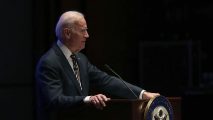1, January 2018
Congo-Kinshasa: UN chief urges President Kabila to step down 0
UN chief Antonio Guterres has urged Democratic Republic of Congo President Joseph Kabila to abide by an agreement to leave power, after at least eight people died in protests against his rule.
Kabila, in power since 2001, signed a deal with opposition groups a year ago agreeing to step down once his current term ends and new elections are held.
But violence has swelled in the giant, troubled African nation after the date of the new vote was pushed back to December 2018, prompting fears that Kabila may seek to extend his reign.
“The secretary-general urges all Congolese political actors to remain fully committed to the 31 December 2016 political agreement, which remains the only viable path to the holding of elections, the peaceful transfer of power and the consolidation of stability in the DRC,” Guterres’ office said in a statement late Sunday.
Eight people were killed on Sunday and dozens arrested as Congolese security forces cracked down on protesters who defied a government ban to demonstrate in Kinshasa and other cities.

Troops fired tear gas into churches and bullets in the air to break up gatherings at Catholic masses, in one case arresting 12 altar boys leading a protest in the capital.
“The secretary-general calls on the government and national security forces to exercise restraint and to uphold the rights of the Congolese people to the freedom of speech and peaceful assembly,” Guterres’ statement said.
DR Congo, rich with mineral wealth but plagued by violence, has not had a peaceful transition of power since independence from Belgium in 1960.
Kabila succeeded his assassinated father Laurent Kabila in 2001 and refused to step down at the end of his second and final term in December 2016.
Elections had been due to take place by the end of this year under a church-mediated deal but were further delayed, and the poll is now scheduled for December 23, 2018.
(Source: AFP)































2, January 2018
Biya regime can get $100M from UN for underfunded or ‘forgotten’ emergencies 0
Cameroon is among nine countries that can avail of at least $100 million in funding from the United Nations in 2018 for underfunded or “forgotten” emergencies. The funds will come from the UN Central Emergency Response Fund (CERF), a voluntary fund pool that supports critical relief operations in crises around the world.
During a pledging conference in New York on Dec. 8, UN Secretary General António Guterres said the CERF would allocate $100 million each for nine countries with “underfunded emergencies.” Aside from Cameroon, the other countries are the Philippines, Democratic Republic of the Congo, Uganda, Tanzania, Mali, Eritrea, Haiti and Pakistan.
Under the grant program, the CERF invites partners to identify projects that could qualify under CERF’s guidelines for underfunded emergencies.
The CERF defines “underfunded emergencies” as crises that cannot be funded sufficiently by governments and appear to have been “forgotten.” While local nongovernment organizations cannot directly receive funds from the CERF, they are encouraged to get involved in the process because they often serve as implementing partners.
The CERF is replenished every year and Guterres said the UN General Assembly passed a resolution in 2016 increasing CERF’s annual funding target from $450 million to $1 billion due to increasing humanitarian needs globally. Protracted crises from long-running conflicts and the impact of natural disasters are likely to continue in 2018, he said, while the impact of climate change was likely to grow and intensify.
In 2017, CERF reached a record high income of $504 million through additional commitments made by donors, according to the United Nations. The fund allocated almost $130 million to help prevent famine in Nigeria, Somalia, South Sudan and Yemen. The fund also supported relief responses such as those for Palestine refugees in Gaza, for Rohingya refugees in Bangladesh, and those affected by hurricanes “Irma” and “Maria” in the Caribbean. Created in 2005, the CERF is managed by the UN Office for the Coordination of Humanitarian Affairs.
Report by the Globalnation. Inquirer